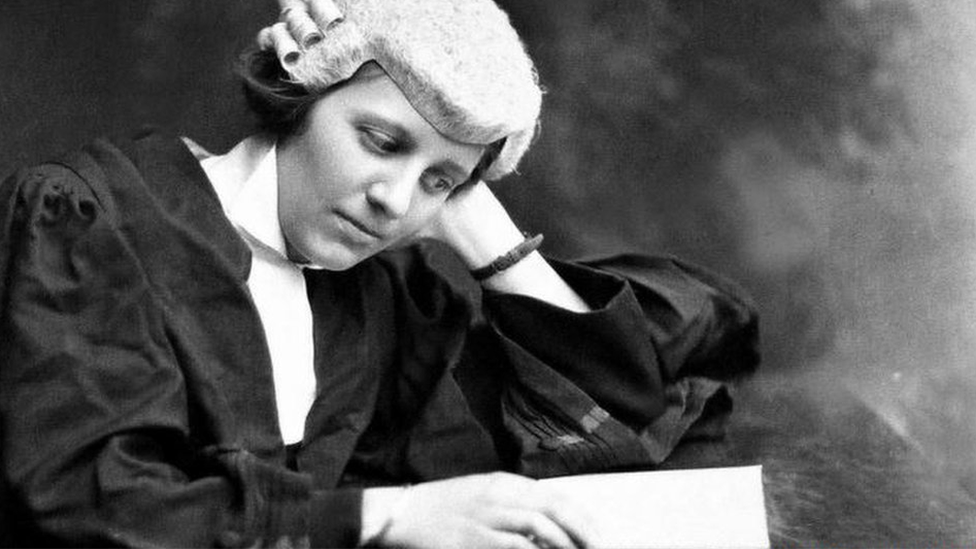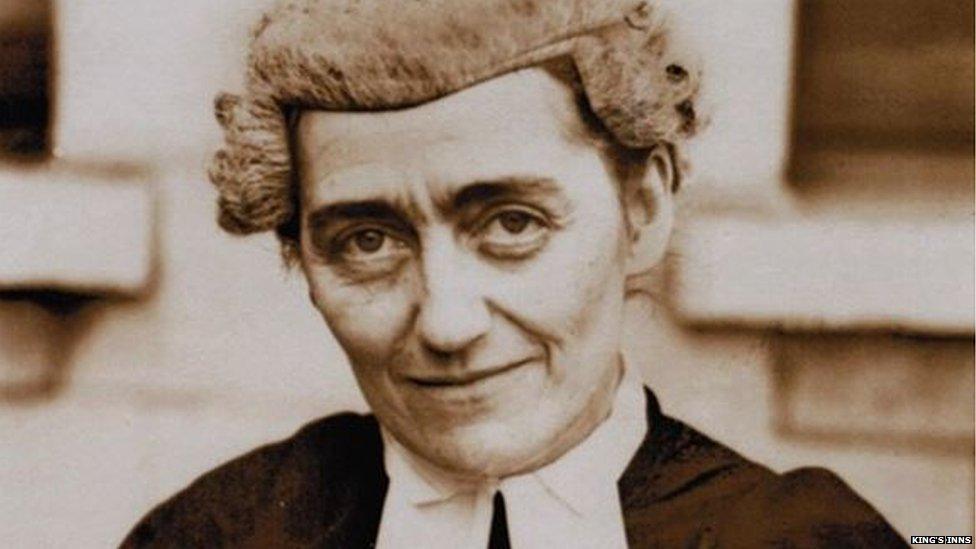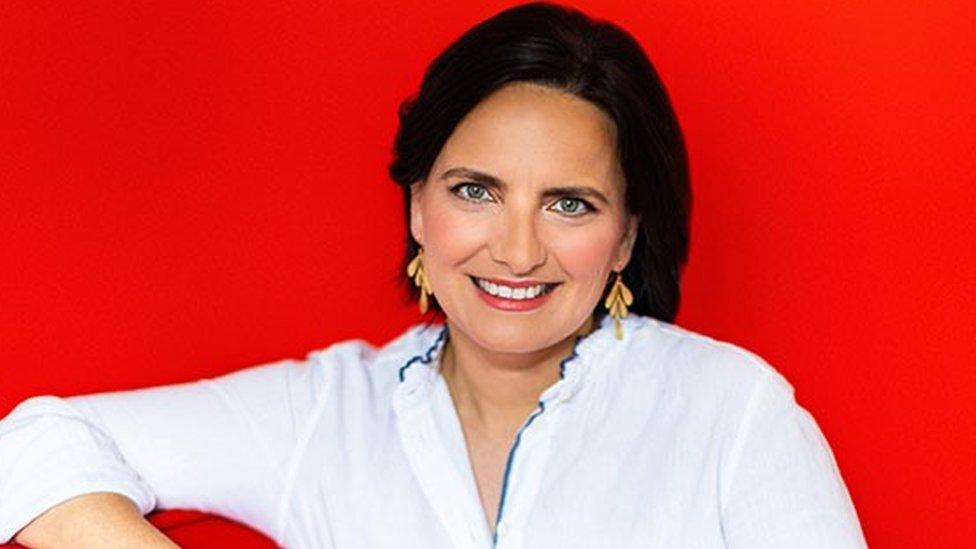Frances Kyle and Averil Deverell: The Irish women who raised the bar
- Published

Frances Kyle, from Belfast, was academically brilliant
A century ago, two women shattered a glass ceiling in the days before anyone knew what those words meant.
The names of Frances "Fay" Kyle and Averil Deverell are written large in the history of the legal profession in Ireland and Britain.
But how many people have heard of them?
On 1 November 1921, they made news across the world when they became the first women to be called to the bar in Ireland and Britain.
They were leaders, trailblazers, serving justice and making history.
Their photograph appeared in the New York Times and the Times of India.
The Irish Times at that time described their breakthrough as "a women's invasion of the law".
'Mother of the Bar'
Ms Deverell, from Greystones, County Wicklow, went on to enjoy a career spanning 40 years.
She was a campaigner for gender equality and worked tirelessly to promote the view that women were equally competent to carry out the same work as men.
She was mentioned in the Irish Times of 1931 as having a reputation among her colleagues for witty repartee.
Later, she became known as the "Mother of the Bar" and mentored other women lawyers.
But striving for equality proved a struggle.
As the centenary of these women's achievement was marked on Monday, Maura McNally, chairwoman of the Council of the Bar of Ireland, said that when Ms Deverell died in 1979, women still only represented 10% of the bar in the Republic of Ireland and there was one single female senior counsel.
"While progress has been made, this centenary reminds us and prompts us that there is more work to be done in achieving gender balance in the legal profession," she said.
"This diversity will help make the profession a mirror of society - hearing and welcoming voices from all - which will lead to better administration of the legal system, and greater access to justice.
"Today, 37% of the bar are female and 44% of new entrants this year are female. Although 67 senior counsel members are female, this represents just 17% of all senior counsel," she said.
'Academically brilliant'
Ms Kyle, born in Belfast in October 1893, was first to be called in 1921.
She had graduated with a BA in French from Trinity College in 1914 and an LLB in 1916.
In January 1920, she and Ms Deverell were admitted as the first female students of law at King's Inns, Dublin.
Ms Kyle was first in the bar entrance examinations and the first woman to win the John Brooke Scholarship.
Historian and author Cormac Moore said Ms Kyle shone academically.
"She was a brilliant linguist," he said.
"She was very strong in languages and she came first in her class at King's Inns beating people who would go on to become Lord Chief Justice.
"She was an extremely strong intellectual."
Ms Kyle chose to practise in Northern Ireland.
In 1922, she was elected as a member of the circuit of Northern Ireland at a meeting in Belfast. She was the first female member of a circuit.
The Dublin Evening Telegraph reported in 1922 that she received eight briefs.
But she, herself, was doubtful about her reception in such a male-dominated world.
She told a Daily Mail representative: "I'm not at all certain that the first women barristers will succeed in making a living at the bar.
"Legal friends advised me to devote myself to conveyancing, which does not require attendance at the courts, but I felt that the first woman barrister should practise, if possible, to prepare the way for those who will follow."
She was nominally on the circuit but, Mr Moore points out that it was very difficult to make a living at the bar, whether you were a man or a woman.
She seemed to have struggled to find work, and her last listing in Thoms Law Directory was in 1931.
In 1937, she appeared in court to defend herself on a parking summons.
By 1952, she was living in London with her sister Kathleen and she died on 12 February, 1958, aged 64.
Mr Moore said she left £12,845 on her death, not a huge sum.

Averil Deverell drove an ambulance in France and Flanders in World War One before becoming a barrister
Ambulance driver
Ms Deverell was born in Dublin. She studied at Trinity and was presented at Court to King George V and Queen Mary on 8 July, 1911.
She served as an ambulance driver in France and Flanders in World War One.
In 1919, the law changed to allow women to become barristers, and in January 1920, she became a student at King's Inns along with Ms Kyle, following the passing of the Sex Disqualification (Removal) Act.
She was called to the bar on the same day as her brother, William.
In 1928, The Londonderry Sentinel reported that Ms Deverell became the first Irish woman barrister to appear before the Privy Council in London.
She was also the first woman to appear in the Supreme Court of Ireland and the Court of Criminal Appeal in Ireland.
Ms Deverell remained in practice until she retired in 1969. She died on 11 February, 1979, aged 86.
Dana Denis-Smith is head of the First 100 Years, a history project that charts the journey of women in law since 1919.
"It's not unusual that people have forgotten them. A lot of the first women pioneers are buried in history," she said.
She was inspired to set up the 100 Years project in the 1980s when she saw a photograph of a group of lawyers, all men, save for one woman.
"One woman in a sea of male lawyers - that was common," she said.
A century ago, the Sex Discrimination Removal Act of 1919 saw "a whole generation of women who wanted to be let in at the gate".
But Ms Denis-Smith said that many who fought for the right to be lawyers did not enjoy long careers.

Ms Denis-Smith says the First 100 Years project is about celebrating the past to shape the future for women in law
"A few of the first ones did not continue to practise, they could not make ends meet," she said.
"They didn't get to rise to the top of the legal profession. They were early flowers, they bloomed and they just went."
This is borne out by the lack of physical evidence of these early women lawyers - the 100 Years project finally found a photograph of the first woman solicitor in the UK just last year.
The 100 Years project is about telling the stories of pioneers like Ms Deverell and Ms Kyle.
"It's important to share these stories so that the current generation know they are not the first. They build on a strong foundation of others who went before," Ms Denis-Smith said.
"The picture of women in law now is truly diverse. There is a completely different generation of lawyers which means justice is served better because they are more representative than the men.
"I am hoping that our positive shift on the stories of past achievements really empowers them."
Meanwhile, the Bar of Ireland is marking this centenary in legal history by commissioning the restoration of Ms Deverell's grave in her native Greystones, County Wicklow.
A public graphic installation at the premises at Church Street in Dublin has also been unveiled and a campaign has been launched to improve the visual representation of female role models by commissioning a portrait for Dublin's King's Inns.